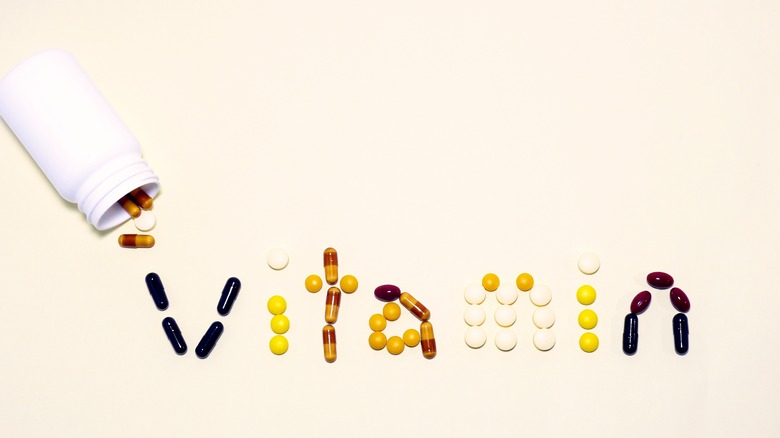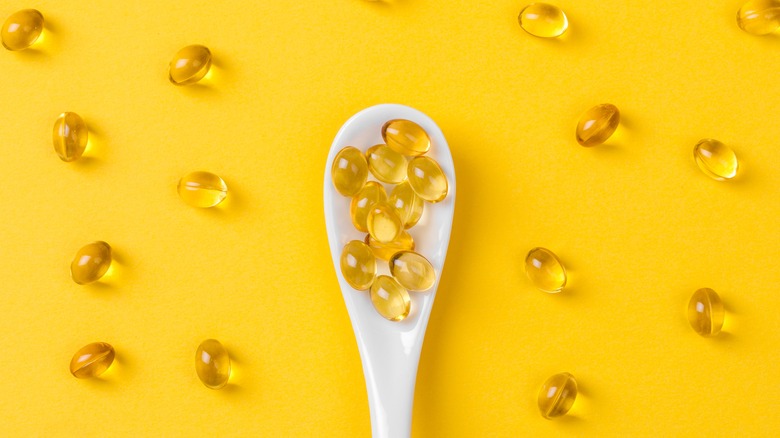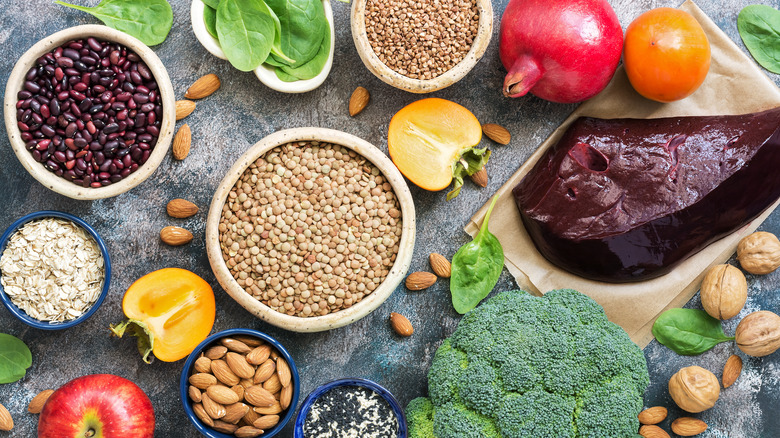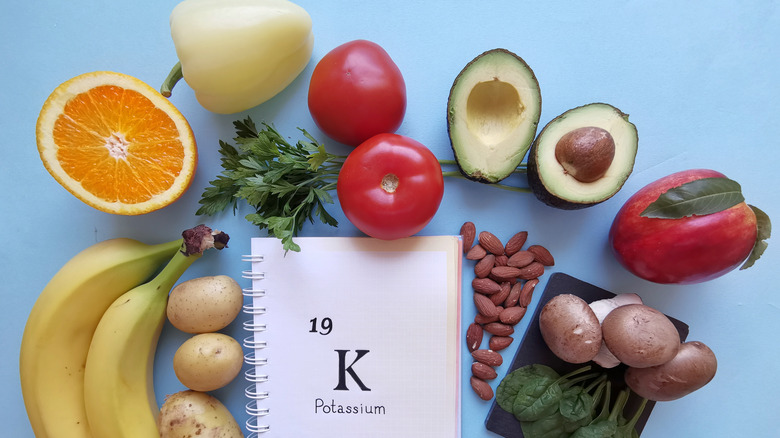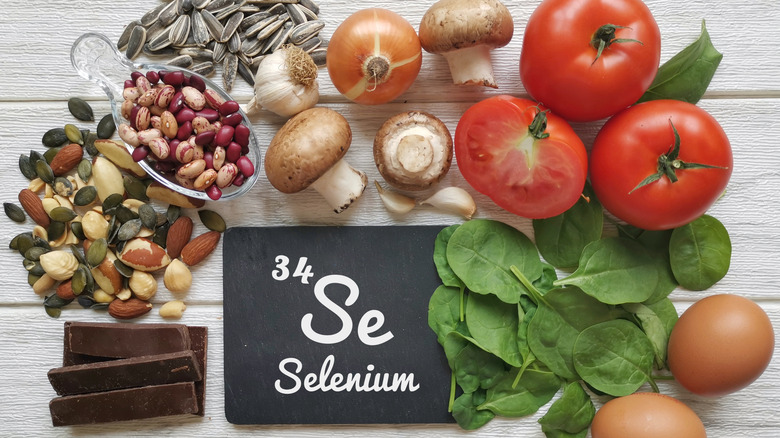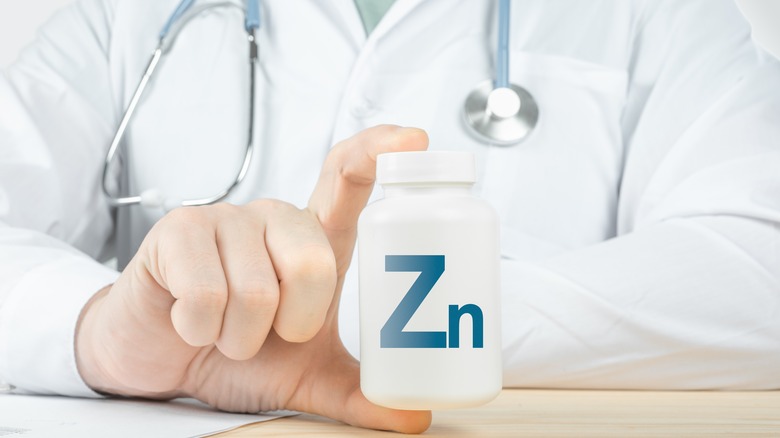All The Major Side Effects Of Vitamin Supplements Explained
Vitamins and minerals are necessary for good health. Eating a balanced diet is the best way to ensure you get what you need each day, but vitamin supplements can also be used to fill in gaps. However, just because vitamins are sold over the counter doesn't mean they don't come with potential side effects. Most negative effects come from taking too much of a single nutrient, or taking many different vitamin supplements together, reports the National Institutes of Health (NIH). Some vitamin supplements may also interact negatively with common medications used to treat health conditions.
Because many foods and drinks are fortified with vitamins and minerals, you may not realize just how much of each nutrient you're getting, which can be risky. Also, the Food and Drug Administration (FDA) doesn't approve or verify the efficacy of supplements before they're sold to consumers, so it can be hard to know exactly what's in your supplement and how much (via FDA). Typically it's best to only take supplements when medically diagnosed with a deficiency. You should also know what side effects may mean you're getting more than you need.
Vitamin D
Vitamin D is known as the "sunshine" vitamin, because your skin synthesizes it when exposed to sunlight (via Journal of Pharmacology and Pharmacotherapeutics). However, due to the prevalence of sunscreen use and long office hours, many people don't get enough of this nutrient. Aging also reduces the body's ability to produce it, according to the National Institutes of Health (NIH). And the Cleveland Clinic notes that 35% of U.S. adults are deficient in vitamin D, and doctors often prescribed over-the-counter supplements (per UT Health Houston).
Vitamin D toxicity is rare, according to the Mayo Clinic, but it's a risk whenever you take supplements — especially high-dose supplements — so it's important to know the signs. Because vitamin D aids your body's ability to absorb the mineral calcium, the most common result of high blood levels of vitamin D is a build-up of calcium in your blood. This can cause side effects including nausea, vomiting, weakness, and increased urination (via the Mayo Clinic). As it progresses, it can also lead to pain in the bones and kidneys and the formation of calcium stones. Calcium stones are a type of kidney stone that can cause severe pain (via Johns Hopkins Medicine).
According to the Mayo Clinic, doses of 60,000 International Units (IU) or more over a period of several months have been shown to cause toxicity. For adults, the Recommended Dietary Allowance (RDA) for vitamin D is only 600 IU, and the upper tolerable limit (UL) is 4,000 IU (via NIH). Some over-the-counter supplements contain many times this amount (via iHerb).
Vitamin B12
About 6% of adults in the United States and U.K. under the age of 60 are deficient in vitamin B12, according to the NIH. Over age 60, that number jumps to 20%, because the body's ability to absorb B12 decreases with age. Vitamin B12 deficiency is also common among vegans and vegetarians, as the richest sources of B12 are animal foods. Some health conditions can also reduce your body's ability to absorb the nutrient (via the Mayo Clinic). High-dose vitamin B12 supplements and injections are often touted to promote increased energy, metabolism, and weight loss, notes the NIH. But none of these uses is scientifically proven, and in the absence of a diagnosed deficiency, extra B12 isn't likely to have any effect.
Vitamin B12 is a water-soluble nutrient, which means the body doesn't store it like it does with the fat-soluble nutrients vitamins A, E, D, and K (via the NIH). It uses what it needs and then excretes the rest in urine. Therefore, high doses of B12 are generally considered safe and non-toxic, but that doesn't mean they won't cause side effects. According to the Mayo Clinic, large doses of B12 can lead to headache, nausea, vomiting, diarrhea, weakness, fatigue, and tingling sensations in the hands and feet. The RDA for vitamin B12 for adults is 2.4 micrograms. There isn't an upper tolerable limit for B12 because it has not been found to cause long-term harm, although it may cause short-term side effects.
Vitamin K
Vitamin K is abundant in leafy green vegetables. Assuming you eat at least the recommended amount of greens, which is 1.5 to 2 cups each week, per the Academy of Nutrition and Dietetics, you should be getting all you need. There are three forms of supplemental vitamin K — 1, 2, and 3. There aren't any known occurrences of toxicity from K1 and K2, according to Stat Pearls – and so, there is no set upper tolerable limit for these nutrients. However, vitamin K3 can be extremely toxic — allergic reactions are not uncommon, along with cytotoxicity in liver cells, and hemolytic anemia caused by a "destruction of red blood cells" at a faster rate than they can be produced (via Johns Hopkins Medicine). Because of this, over-the-counter sale of vitamin K3 has been prohibited in the United States.
The most important warning for vitamin K supplements is for people taking the prescription blood thinner warfarin. Because of the role it plays in blood clotting, too much vitamin K can have a severe interaction with warfarin — "A sudden change in the amount of vitamin K you get can cause dangerous bleeding (if you consume less) or blood clots (if you consume more)," according to the NIH. People taking warfarin must be careful to keep their vitamin K intake from foods and supplements at a stable level. Many multivitamin supplements contain vitamin K, so if you also eat a lot of foods high in the vitamin it's cause for concern.
Vitamin C
Citrus fruits are the best source of vitamin C, a nutrient with so many benefits for health, including its role as an antioxidant. Antioxidants scavenge free radicals that can damage cells and lead to cancer formation. "Free radicals are compounds formed when our bodies convert the food we eat into energy. People are also exposed to free radicals in the environment from cigarette smoke, air pollution, and ultraviolet light from the sun" (via the NIH).
Vitamin C also helps the body make collagen, which plays a major role in wound-healing and skin health (per NIH and International Journal of Cosmetic Science). As a water-soluble vitamin, your body doesn't store vitamin C, and excess is excreted in urine. According to the Mayo Clinic, too much vitamin C isn't likely to be harmful; however, there is an upper tolerable limit set at 2,000 milligrams per day. Taking large doses of vitamin C could cause diarrhea, nausea, vomiting, heartburn, stomach cramps, and headache. People who have a condition called hemochromatosis, which causes a build-up of iron in the blood, should also be cautious. Vitamin C helps your body absorb plant-based iron, but "high doses of vitamin C could worsen iron overload and damage body tissues" (via NIH).
Vitamin C deficiency is rare in the United States, and the RDA for adults for vitamin C is 90 milligrams for men and 75 milligrams for women (per the Mayo Clinic). One small orange contains 50 milligrams (via My Food Data). Therefore, vitamin C supplements are typically unnecessary; however, smokers, people who eat a very limited diet, and those with certain health conditions such as malabsorption, certain cancers, and kidney disease that requires hemodialysis may benefit from supplemental vitamin C (via NIH).
Vitamin A
Best known for its abundance in carrots and its contribution to healthy eyesight, vitamin A is a fat-soluble nutrient that also acts as an antioxidant to protect against cell damage (via the Mayo Clinic). The RDA for vitamin A is 900 micrograms for men and 700 micrograms for women. One cup of cooked spinach has 943 micrograms of vitamin A, and 1 cup of cooked carrots has 1,329 micrograms (via My Food Data). Therefore, if you're eating a balanced diet, vitamin A supplementation is unnecessary.
It can also be dangerous. The upper tolerable limit for vitamin A is 3,000 IU, per Harvard Health. A single large dose of 200,000 micrograms can have unpleasant impacts, such as vomiting, vertigo, nausea, and blurred vision (via the Mayo Clinic). Ongoing doses more than 10,000 micrograms per day can have serious consequences, such as joint pain, bone thinning, and damage to your liver. Pregnant women should be particularly careful as high doses of vitamin A can cause birth defects.
Vitamin E
Vitamin E is another fat-soluble nutrient that's stored in the body. It acts as an antioxidant, scavenging free radicals that damage cells (via the NIH). It's also important for immune system health and preventing blood clots. The upper tolerable limit for vitamin E is set at 1,000 milligrams per day. Taking more than this increases the risk of bleeding, because it lowers the body's ability to form blood clots after an injury. It can also cause bleeding in the brain, called hemorrhagic stroke, a serious condition that impedes brain function (via Cedars Sinai). Vitamin E can also interact with certain medications, potentially with serious side effects. For example, vitamin E can interact with the blood-thinning medication warfarin, which puts you at a higher risk of bleeding.
Prostate cancer is another worrying side effect of regular vitamin E supplementation. A 2011 study in JAMA found that men who took 400 IU per day of synthetic vitamin E over seven to 12 years had a significantly increased risk of developing prostate cancer. Being deficient in Vitamin E is not common in people who are healthy (via NIH). Most often deficiency is caused by medical conditions that compromise the body's ability to absorb nutrients from food, such as Crohn's disease and cystic fibrosis. Therefore, supplementation is unnecessary — most people can get everything they need from eating vitamin E-rich foods such as nuts, vegetable oils, fortified foods, and green vegetables.
Calcium
Calcium makes up 1.5-2% of body weight, which means it's the most plentiful mineral in the human body – and 99% of calcium is found in the skeleton (via NIH). Dairy products are the best source of calcium, and The Dietary Guidelines for Americans recommend consuming 2 to 3 cups of dairy each day. However, 90% of the population isn't meeting these recommendations (via the USDA). And, according to a 2020 study in Nutrients, calcium ranks in the top 10 most popular dietary supplements.
But many experts recommend caution when using calcium supplements, as increasing amounts of research link them with the development of colon polyps, kidney stones, and calcium build up in the heart's arteries that can contribute to heart attacks (via Johns Hopkins Medicine). According to the Mayo Clinic, hypercalcemia (too much calcium in the blood) can also make your bones weak and affect brain function. Symptoms of excess calcium may include excessive thirst and urination; upset stomach, vomiting, nausea, and constipation; bone and muscle pain; lethargy, fatigue, and confusion; heart palpitations and fainting.
Taking too much vitamin D along with calcium can compound the problem, as vitamin D encourages calcium absorption, according to the NIH. Women and all adults over 71 years of age need 1,200 milligrams of calcium a day, and adult men under 71 need 1,000 milligrams each day. The daily upper tolerable limit is set at 2,500 milligrams for adults 19 to 50 years old and 2,000 milligrams for adults over 51.
Iron
The mineral iron is a critical nutrient that comprises hemoglobin, "a protein which carries oxygen from our lungs throughout our bodies" (via MedlinePlus). Iron is abundant in animal foods, and most adults in the United States meet the RDA of 18 milligrams for women ages 19 to 50 and 8 milligrams for men and all adults over 50 (via the NIH). However, certain populations have a higher risk of being deficient in iron, including teenagers, pregnant women, teen girls and women with heavy periods, people who donate blood frequently, and those who have cancer, gastrointestinal disorders, or heart failure. In these cases, supplemental iron may be necessary.
However, if you haven't been diagnosed with iron deficiency, you shouldn't take an iron supplement without your doctor's permission. The effects of too much iron in the blood can be serious, including poisoning. If taken in large doses, iron can cause severe symptoms such as a build-up of fluid in the lungs, diarrhea, black and bloody stool, liver damage, vomiting blood, dehydration, low blood pressure, fast and weak pulse, shock, chills, coma, fever, dizziness, convulsions, headache, apathy and lack of motivation, bluish-tinged lips and fingernails, pale skin, jaundice, or flushing of the skin (via Mount Sinai).
People who have the genetic disorder hemochromatosis should be especially careful. Hemochromatosis causes your body to soak up too much iron, which is then stored in your liver, heart, skin, and joints – it's a major cause of iron overload and its accompanying side effects (via Beth Israel Lahey Health Winchester Hospital).
Potassium
Potassium is an electrolyte mineral — along with sodium, calcium, magnesium, chloride, and phosphorous — that carries an electrical charge and regulates the amount of water in your cells, supports muscle function and maintains normal blood pressure (via MedlinePlus and Harvard T.H. Chan School of Public Health). The RDA for potassium is 2,600 milligrams for woman and 3,400 milligrams for men. There isn't an upper tolerable limit because in people with healthy kidney function, excess of the mineral is removed in urine (via the NIH) But certain populations are at higher risk of side effects from large amounts of potassium through food and supplements, including those with compromised kidney function and those who take certain medications including ACE inhibitors and postassium-sparing diuretics.
Potassium overload — called hyperkalemia — can have deleterious effects on the heart and lead to heart attack, according to the Cleveland Clinic. Hyperkalemia may cause no symptoms at all. Or, symptoms may appear slowly over a period of time. Common symptoms include abdominal pain, diarrhea, heart palpitations or irregular heartbeat (arrhythmia), muscle weakness or numbness in the limbs, nausea and vomiting. Hyperkalemia can also come on suddenly, resulting in heart attack. Even mild hyperkalemia and cause long-term heart damage.
Selenium
Brazil nuts are the richest food source of the mineral selenium, providing a whopping 68-91 micrograms per nut, according to the NIH. That's considerably more than the RDA of 55 micrograms for adults. Just five Brazil nuts can contain enough selenium to surpass the daily upper tolerable limit of 400 micrograms. Selenium is also abundant in seafood, meat, eggs, dairy, breads, cereals, and other grains. Your body needs enough selenium each day for health. It's crucial for reproduction, production of DNA, healthy thyroid function, and protection from cell-damaging free radicals.
However, go overboard and you could experience side effects ranging from annoying to serious. Regularly taking in too much selenium from food and supplements can cause garlic breath, diarrhea, nausea, irritability, brittle hair and nails, tooth discoloration, nausea, skin rash, a metallic taste in your mouth, loss of hair and nails, and potential nervous system problems. Very high selenium intake can cause kidney failure, difficulty breathing, tremors, heart attack, and heart failure.
Zinc
Zinc is a popular supplement during cold season. When taken within 24 hours of the first signs of a cold, it may prevent the virus from multiplying, reducing the severity and duration of the illness. According to the Mayo Clinic, it's efficacy for that purpose still hasn't been conclusively determined in scientific studies. However, it is crucial to get enough zinc in your diet to support normal immune function.
Zinc also supports wound-healing, metabolism, and your sense of taste and smell (via the Mayo Clinic). The RDA for zinc is 8 milligrams for women and 11 milligrams for men, and the upper tolerable limit is 40 milligrams (via NIH). This is for zinc from all sources — food, supplements, beverages, and medications. Even some denture creams contain high amounts of zinc and can contribute to zinc overload, symptoms of which include upset stomach, nausea, dizziness, headache, vomiting, and loss of appetite.
Getting too much zinc over a long period of time can compromise immune function and lower your levels of the healthy HDL cholesterol in your blood that helps remove the bad LDL cholesterol from your body (via the NIH and the Centers for Disease Control and Prevention). "People who take high amounts of zinc, iron, or vitamin C may need more copper" (via Mount Sinai). Copper deficiency symptoms include anemia, bone fractures, osteoporosis, low body temperature, low white blood cell count, loss of skin pigmentation, irregular heartbeat, and issues with your thyroid.
Do you really need vitamin supplements?
Unless your doctor diagnoses you with a deficiency or you have a condition that affects how your body absorbs nutrients from food, you most likely do not need to take a vitamin or mineral supplement. According to Harvard Health, there is limited scientific evidence showing that supplements improve health. A healthy diet will provide most people with all the nutrients they need (via the NHS). In fact, supplements are often a waste of money, according to Northwestern University.
They also have the potential to be dangerous — in the case of supplements, there can be too much of a good thing. Another problem is that the supplement industry isn't reliably regulated by the Food and Drug Administration, according to 2015 article in the American Journal of Public Health. There have been cases in which the contents inside the supplement are different from what's on the label. For example, in one case, a liquid selenium supplement was found to have 200 times the amount listed on the label, resulting in an outbreak of selenium toxicity and the hospitalization of one individual (via Archives of Internal Medicine). While this isn't common, it does happen.
There is little risk of side effects from nutrients when you get them through food. Supplements are expensive, so your health and wallet are probably better off if you invest your hard-earned cash in organic, farm fresh whole foods.

